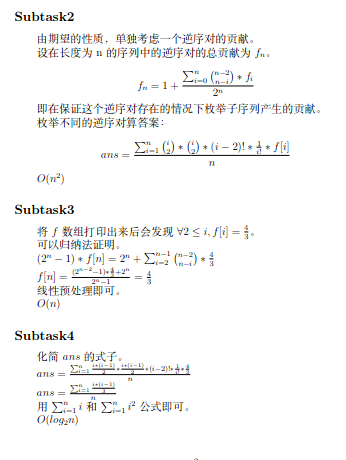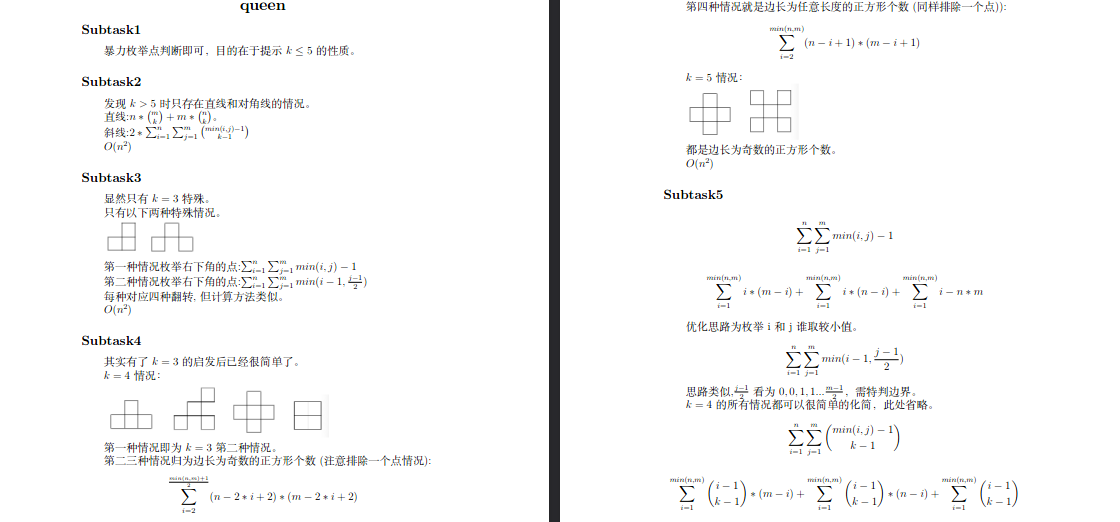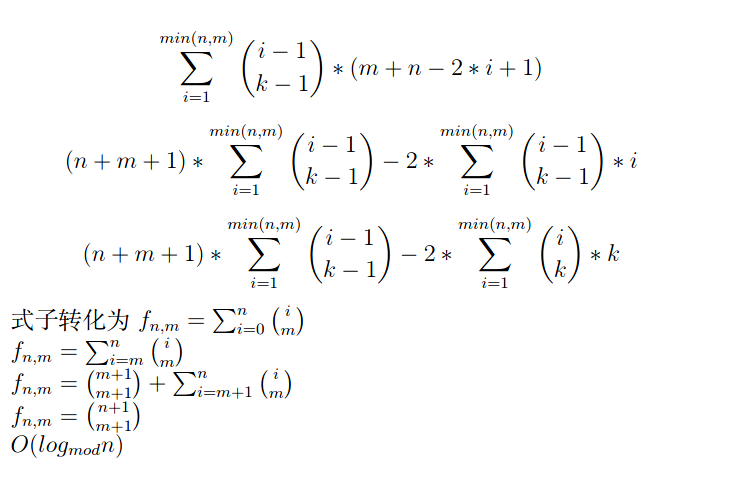7.27考试总结(NOIP模拟25)[random·string·queue]
死亡的尽头,没有神
T1 random
解题思路
这波是找规律完胜了。。
lby dalao根据样例找出了正确的式子:\(\dfrac{n^2-1}{9}\)
然而,我这个菜鸡却推出了这样一个错误的式子:\(\dfrac{(n-1)^2\times 2^n}{n^2\times (n+1)}\)
那么哪个像正解呢,当然是我的这个了(虽然他一点道理没有)。。。
别的啥也不想说了,看一下官方题解吧。。。

zxb的题解
考虑一个逆序对对答案的贡献:
这样可以得到:
数学归纳法可以证得,\(f_i\)为\(\frac{4}{3}\),所以可以进一步化简。
这明显是一个结论题,打表貌似也可行?
code
#include<bits/stdc++.h>
#define int long long
using namespace std;
const int mod=998244353,INV_9=443664157;
int n,T;
signed main()
{
scanf("%lld",&T);
while(T--){
scanf("%lld",&n);
n=n%mod;
printf("%lld\n",(n%mod*n%mod-1)*INV_9%mod);
}
return 0;
}
T2 string
解题思路
首先明确一下:是把前缀接在后缀后面。
这样就可以直接拼接对于每一个拼好的串维护一个 Hash 值,然后匹配就好了(40pts到手)
对于官方题解里的 Subtask3 其实是可以卡到 90pts 的,只要剪一下枝就好了。
只可惜我太菜只卡到了 80pts 。
思路还是和题解一样的维护每个串的 Hash 后,计算出在大串上作为后缀结尾和前缀开头的数量,分别记到 f 和 g 数组里。
正解还是在求 f 和 g 数组,对于之前的操作有了一个优化。
先把 n 个串分别正反压入两个 Tire 树,然后就可以处理出每个位置的后缀或者前缀的数量。
然后在 Tire 树上 DFS 一遍就可以求出每一个的 Hash 值,然后的操作就与前面的差不多了,不过是加了一个二分优化。
注意要用不会自动排序的 unordered_map 以及在查找是否有值的时候用 find 函数,不要直接调用值。
code
40pts
#include<bits/stdc++.h>
#define int long long
using namespace std;
inline int read()
{
int x=0,f=1;
char ch=getchar();
while(ch>'9'||ch<'0')
{
if(ch=='-') f=-1;
ch=getchar();
}
while(ch>='0'&&ch<='9')
{
x=(x<<1)+(x<<3)+(ch^48);
ch=getchar();
}
return x*f;
}
const int N=2e5+10,M=1e3+10;
const unsigned long long base=13331ull;
int n,len,ans;
unsigned long long has[N],ha[N],p[N];
string s,ch[N];
signed main()
{
cin>>s;
len=s.size();
s=" "+s;
n=read();
p[0]=1;
for(int i=1;i<=len+1;i++)
p[i]=p[i-1]*base;
for(int i=1;i<=n;i++)
cin>>ch[i];
for(int i=1;i<s.size();i++)
has[i]=has[i-1]*base+s[i];
for(int i=1;i<=n;i++)
for(int j=1;j<=n;j++)
{
string c=" "+ch[i]+ch[j];
int fjx=ch[i].size(),le=c.size()-1;
for(int k=1;k<=le;k++)
ha[k]=ha[k-1]*base+c[k];
for(int l=1;l<=fjx;l++)
for(int r=fjx+1;r<=le;r++)
{
int lent=r-l+1;
for(int k=1;k+lent-1<=len;k++)
{
int pos=k+lent-1;
unsigned long long temp=has[pos]-has[k-1]*p[pos-k+1]+base*10;
unsigned long long tmp=ha[r]-ha[l-1]*p[r-l+1]+base*10;
if(temp==tmp) ans++;
}
}
}
printf("%lld",ans);
return 0;
}
80pts(最高90pts)
#include<bits/stdc++.h>
#define int long long
#define ull unsigned long long
using namespace std;
inline int read()
{
int x=0,f=1;
char ch=getchar();
while(ch>'9'||ch<'0')
{
if(ch=='-') f=-1;
ch=getchar();
}
while(ch>='0'&&ch<='9')
{
x=(x<<1)+(x<<3)+(ch^48);
ch=getchar();
}
return x*f;
}
const int N=1e5+10;
const ull base=131ull;
int n,len,ans,lent[N],f[N],g[N];
ull has[N],p[N];
vector<ull > ha[N];
char s[N],ch[N];
signed main()
{
scanf("%s",s+1);
len=strlen(s+1);
scanf("%lld",&n);
p[0]=1;
for(int i=1;i<=len;i++)
p[i]=p[i-1]*base;
for(int i=1;i<=len;i++)
has[i]=has[i-1]*base+s[i];
for(int i=1;i<=n;i++)
{
scanf("%s",ch+1);
lent[i]=strlen(ch+1);
ha[i].push_back(0);
for(int j=1;j<=lent[i];j++)
ha[i].push_back(ha[i][j-1]*base+ch[j]);
}
for(int i=1;i<=len;i++)
for(int j=1;j<=n;j++)
{
int le=lent[j];
for(int k=1;k<=le;k++)
{
ull tmp1=ha[j][le]-ha[j][le-k]*p[k];
ull tmp2=has[i]-has[i-k]*p[k];
if(tmp1==tmp2) f[i]++;
else break;
}
for(int k=1;k<=le;k++)
{
ull tmp1=ha[j][k];
ull tmp2=has[i+k-1]-has[i-1]*p[k];
if(tmp1==tmp2) g[i]++;
else break;
}
}
for(int i=1;i<=len;i++)
ans+=f[i]*g[i+1];
printf("%lld",ans);
return 0;
}
正解
#include<bits/stdc++.h>
#define int long long
#define ull unsigned long long
#define f() cout<<"Pass"<<endl
using namespace std;
inline int read()
{
int x=0,f=1;
char ch=getchar();
while(ch>'9'||ch<'0')
{
if(ch=='-') f=-1;
ch=getchar();
}
while(ch>='0'&&ch<='9')
{
x=(x<<1)+(x<<3)+(ch^48);
ch=getchar();
}
return x*f;
}
const int N=1e5+10,M=5e5+10;
const ull base=1331;
vector<int> ch[N];
char s[N],c[N];
int len[N],n,lent,ans,f[N],g[N];
ull p[N],preh[N],sufh[N];
struct Tire
{
int all,tre[M][30],val[M*30];
unordered_map<ull,int> mp;
Tire(){all=1;}
void insert(int pos)
{
int rt=1;
for(int i=0;i<len[pos];i++)
{
int num=ch[pos][i];
if(!tre[rt][num]) tre[rt][num]=++all;
rt=tre[rt][num];
val[rt]++;
}
}
void dfs(int x,ull cnt)
{
mp[cnt]=val[x];
for(int i=1;i<=26;i++)
if(tre[x][i])
{
val[tre[x][i]]+=val[x];
dfs(tre[x][i],cnt*base+i);
}
}
}pre,suf;
signed main()
{
scanf("%s",s+1);
lent=strlen(s+1);
n=read();
for(int i=1;i<=n;i++)
{
scanf("%s",c+1);
len[i]=strlen(c+1);
for(int j=1;j<=len[i];j++)
ch[i].push_back(c[j]-'a'+1);
}
for(int i=1;i<=n;i++)
pre.insert(i);
for(int i=1;i<=n;i++)
reverse(ch[i].begin(),ch[i].end());
for(int i=1;i<=n;i++)
suf.insert(i);
pre.dfs(1,0);
suf.dfs(1,0);
p[0]=1;
for(int i=1;i<=lent;i++)
p[i]=p[i-1]*base;
for(int i=1;i<=lent;i++)
preh[i]=preh[i-1]*base+s[i]-'a'+1;
for(int i=lent;i>=1;i--)
sufh[i]=sufh[i+1]*base+s[i]-'a'+1;
for(int i=1;i<=lent;i++)
{
int temp=0,l=1,r=lent-i+1;
if(pre.mp.find(s[i]-'a'+1)!=pre.mp.end())
{
while(l<=r)
{
int mid=(l+r)>>1;
if(pre.mp.find(preh[i+mid-1]-preh[i-1]*p[mid])!=pre.mp.end()) l=mid+1,temp=mid;
else r=mid-1;
}
g[i]=pre.mp[preh[i+temp-1]-preh[i-1]*p[temp]];
}
temp=0;l=0,r=i;
if(suf.mp.find(s[i]-'a'+1)!=suf.mp.end())
{
while(l<=r)
{
int mid=(l+r)>>1;
if(suf.mp.find(sufh[i-mid+1]-sufh[i+1]*p[mid])!=suf.mp.end()) l=mid+1,temp=mid;
else r=mid-1;
}
f[i]=suf.mp[sufh[i-temp+1]-sufh[i+1]*p[temp]];
}
}
for(int i=1;i<=lent;i++)
ans+=f[i]*g[i+1];
printf("%lld",ans);
return 0;
}
T3 queen
解题思路
其实就是推式子,然后敲就行了。。
比较重要的就是一个柿子:\(\sum\limits_{i=1}^{n}i^2=\dfrac{n\times (n+1)\times (2n+1)}{6}\)
考场上推了一下 k=3 的以为 4以及以上的有非常难的一些东西就直接弃掉了。
考完之后看了一下 k=1 的情况没有取\(\bmod\),挂了20pts
然后就是公式乱用,然后就是非常恶心的边界问题,官方题解写的就挺好:


zxb的题解
这个计数挺麻烦的。
分析性质,看到棋子为1时\(ans=n\times m\)。
棋子为二时或大于五时考虑一行或一列:\(n\times C_m^k+m\times C_n^k\)
考虑对角线:\(\sum_{i=1}^{n}\sum_{j=1}^{m}{C_{min(i,j)-1}^{k-1}}\)
三四五多出来好多种情况,具体应该是三种形态。
任意正方形:
奇数正方形
奇奇怪怪的矩形:
现在已经有80pts了,我们还需要继续化简,搞成可以\(\mathcal O(1)\)查询。
式子挺多,先来看斜线上的。
任意正方形:
然后分别利用通项公式求和:
第一项:
第二项:
第三项:
这样每一步都可以很快求出。奇数正方形同上。
对于矩形只需看成\(0,0,1,1,........\)即可,普通正方形还有一种形式:
这是类似的,化成两倍的形式就行,然后特判边界是奇还是偶。
code
80pts
#include<bits/stdc++.h>
#define int long long
using namespace std;
inline int read()
{
int x=0,f=1;
char ch=getchar();
while(ch>'9'||ch<'0')
{
if(ch=='-') f=-1;
ch=getchar();
}
while(ch>='0'&&ch<='9')
{
x=(x<<1)+(x<<3)+(ch^48);
ch=getchar();
}
return x*f;
}
const int N=1e3+10,mod=3e5+7;
int T,n,m,k,ans,c[N][N];
void get_C()
{
c[0][0]=1;
for(int i=1;i<N;i++)
{
c[i][0]=c[i][i]=1;
for(int j=1;j<i;j++)
{
c[i][j]=(c[i-1][j-1]+c[i-1][j])%mod;
}
}
}
void solve()
{
n=read();
m=read();
k=read();
ans=0;
if(k>m&&k>n)
{
cout<<0<<endl;
return ;
}
if(k==1)
{
cout<<n*m%mod<<endl;
return ;
}
if(m>n) swap(n,m);
ans=(c[n][k]*m%mod+c[m][k]*n%mod)%mod;
for(int i=k;i<m;i++)
ans=(ans+c[i][k]*4%mod)%mod;
ans=(ans+2*c[m][k]%mod*(n-m+1)%mod)%mod;
if(k==3)
{
for(int len=2;len<=m;len++)
ans=(ans+(n-len+1)*(m-len+1)%mod*4%mod)%mod;
for(int len=2;len<=n&&2*len-1<=m;len++)
ans=(ans+(n-len+1)*(m-2*len+2)%mod*2%mod)%mod;
for(int len=2;len<=m&&2*len-1<=n;len++)
ans=(ans+(m-len+1)*(n-2*len+2)%mod*2%mod)%mod;
}
if(k==4)
{
for(int len=2;len<=m;len++)
ans=(ans+(n-len+1)*(m-len+1)%mod)%mod;
for(int len=2;len<=n&&2*len-1<=m;len++)
ans=(ans+(n-len+1)*(m-2*len+2)%mod*2%mod)%mod;
for(int len=2;len<=m&&2*len-1<=n;len++)
ans=(ans+(m-len+1)*(n-2*len+2)%mod*2%mod)%mod;
for(int len=1;2*len+1<=m;len++)
ans=(ans+(m-2*len)*(n-2*len)%mod*5%mod)%mod;
}
if(k==5)
{
for(int len=1;2*len+1<=m;len++)
ans=(ans+(m-2*len)*(n-2*len)%mod*2%mod)%mod;
}
printf("%lld\n",ans%mod);
}
signed main()
{
T=read();
get_C();
while(T--) solve();
return 0;
}
正解(代码略丑)
#include<bits/stdc++.h>
#define int long long
#define f() cout<<"Pass"<<endl
using namespace std;
inline int read()
{
int x=0,f=1;
char ch=getchar();
while(ch>'9'||ch<'0')
{
if(ch=='-') f=-1;
ch=getchar();
}
while(ch>='0'&&ch<='9')
{
x=(x<<1)+(x<<3)+(ch^48);
ch=getchar();
}
return x*f;
}
const int N=1e3+10,mod=3e5+7;
int T,n,m,pn,pm,k,ans,jc[mod+10],inv[mod+10];
int ksm(int x,int y)
{
int temp=1;
while(y)
{
if(y&1) temp=temp*x%mod;
x=x*x%mod;
y>>=1;
}
return temp%mod;
}
int work(int x,int y)
{
if(y>x) return 0;
return jc[x]*ksm(jc[y],mod-2)%mod*ksm(jc[x-y],mod-2)%mod;
}
int C(int x,int y)
{
if(y>x) return 0;
if(!x||!y) return 1;
return C(x/mod,y/mod)*work(x%mod,y%mod)%mod;
}
void solve()
{
n=read();
m=read();
k=read();
if(m<n) swap(n,m);
pn=(n-1)%mod+1;
pm=(m-1)%mod+1;
if(k>m&&k>n)
{
cout<<0<<endl;
return ;
}
if(k==1)
{
cout<<pn*pm%mod<<endl;
return ;
}
ans=(C(n,k)*pm%mod+C(m,k)*pn%mod+2*(m-n+1)%mod*C(n,k)%mod+4*C(n,k+1)%mod)%mod;
if(k==3)
{
int tmp1=(min(m,n/2)-1)%mod+1,tmp2=(min(n,m/2)-1)%mod+1;
n=pn;m=pm;
ans=(ans+4ll*(m*n%mod*(n-1)%mod-(m+n)*(n-1)%mod*n%mod*ksm(2,mod-2)%mod+(n-1)*n%mod*(2*n-1)%mod*ksm(6,mod-2)%mod+2ll*mod)%mod)%mod;
ans=(ans+2ll*(-tmp1*(tmp1+1)%mod*ksm(2,mod-2)%mod*(n+m*2)%mod+(tmp1+1)*tmp1%mod*(2*tmp1+1)%mod*ksm(6,mod-2)%mod*2ll%mod+n*m%mod*tmp1%mod+mod*2)%mod)%mod;
ans=(ans+2ll*(-tmp2*(tmp2+1)%mod*ksm(2,mod-2)%mod*(m+n*2)%mod+(tmp2+1)*tmp2%mod*(2*tmp2+1)%mod*ksm(6,mod-2)%mod*2ll%mod+n*m%mod*tmp2%mod+mod*2)%mod)%mod;
}
if(k==4)
{
int tmp1=(min(m,n/2)-1)%mod+1,tmp2=(min(n,m/2)-1)%mod+1,temp1=(n-1)/2%mod,temp2=n/2%mod;
n=pn;m=pm;
ans=(ans+(m*n%mod*(n-1)%mod-(m+n)*(n-1)%mod*n%mod*ksm(2,mod-2)%mod+(n-1)*n%mod*(2*n-1)%mod*ksm(6,mod-2)%mod+2ll*mod)%mod)%mod;
ans=(ans+2ll*(-tmp1*(tmp1+1)%mod*ksm(2,mod-2)%mod*(n+m*2)%mod+(tmp1+1)*tmp1%mod*(2*tmp1+1)%mod*ksm(6,mod-2)%mod*2ll%mod+n*m%mod*tmp1%mod+mod*2)%mod)%mod;
ans=(ans+2ll*(-tmp2*(tmp2+1)%mod*ksm(2,mod-2)%mod*(m+n*2)%mod+(tmp2+1)*tmp2%mod*(2*tmp2+1)%mod*ksm(6,mod-2)%mod*2ll%mod+n*m%mod*tmp2%mod+mod*2)%mod)%mod;
ans=(ans+4*(n*m%mod*temp1%mod+4*(temp1+1)%mod*temp1%mod*(2*temp1+1)%mod*ksm(6,mod-2)%mod-2*(n+m)%mod*temp1%mod*(temp1+1)%mod*ksm(2,mod-2)%mod+2*mod)%mod)%mod;
ans=(ans+n*m%mod*temp2%mod+4*(temp2+1)%mod*temp2%mod*(2*temp2+1)%mod*ksm(6,mod-2)%mod-2*(n+m)%mod*temp2%mod*(temp2+1)%mod*ksm(2,mod-2)%mod+2*mod)%mod;
}
if(k==5)
{
int temp1=(n-1)/2%mod,temp2=n/2%mod;
n=pn;m=pm;
ans=(ans+n*m%mod*temp1%mod+4*(temp1+1)%mod*temp1%mod*(2*temp1+1)%mod*ksm(6,mod-2)%mod-2*(n+m)%mod*temp1%mod*(temp1+1)%mod*ksm(2,mod-2)%mod+2*mod)%mod;
ans=(ans+n*m%mod*temp2%mod+4*(temp2+1)%mod*temp2%mod*(2*temp2+1)%mod*ksm(6,mod-2)%mod-2*(n+m)%mod*temp2%mod*(temp2+1)%mod*ksm(2,mod-2)%mod+2*mod)%mod;
}
printf("%lld\n",ans%mod);
}
void init()
{
jc[0]=1;
for(int i=1;i<=mod;i++)
jc[i]=jc[i-1]*i%mod;
inv[mod-1]=ksm(jc[mod-1],mod-2);
inv[0]=inv[1]=1;
for(int i=mod-2;i>=1;i--)
inv[i]=inv[i+1]*(i+1)%mod;
}
signed main()
{
T=read();
init();
while(T--) solve();
return 0;
}


 浙公网安备 33010602011771号
浙公网安备 33010602011771号